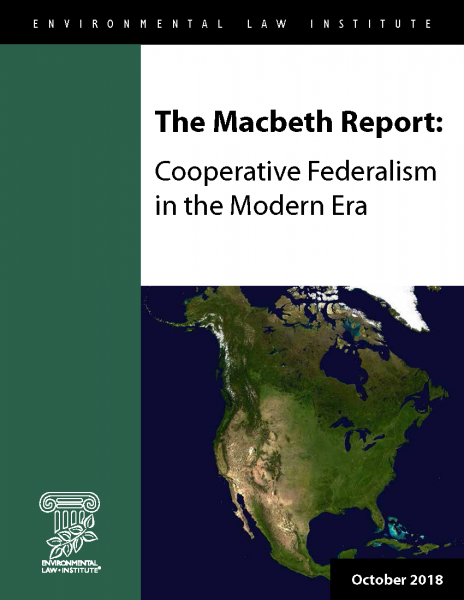Welcome to 2019, a year that stands to be both stimulating and challenging, taking into account all that is happening in our sphere. It also promises to be a year that is deeply reflective for ELI, as we celebrate the Institute's 50th anniversary—50 years of building effective governance and rule of law for environmental protection. The idea around which our programing for the year will be organized is "building on the past to secure the future," and, as you can discern from our website, we will have under this broader rubric a monthly theme and focus. January's theme is pollution prevention.
Given the centrality of the state-federal relationship to pollution prevention efforts in the United States, and the fact that ELI recently released an important new report on the topic of “cooperative federalism,” I thought I would open the year with a brief reflection on this topic.
In the Summer of 2017, with support, encouragement, and input from across the ELI community and in cooperation with the Environmental Council of States (ECOS), ELI undertook a special project on cooperative federalism in memory of our dear departed colleague Angus Macbeth. “The Macbeth Dialogues” sought to bring together leading experts to discuss the federal-state relationship in the environmental sphere, in hopes of shining a light on law and policy solutions for optimizing the configuration of governmental roles.
 Under this project, we convened a Chatham House Rules gathering of current and former senior state and federal officials, many of whom had worn both state and federal hats. We also convened several dialogues with a broader array of stakeholders and did some rather extensive surveying. The resulting report, The MacBeth Report: Cooperative Federalism in the Modern Era, is, I believe, one of the more thoughtful pieces on cooperative federalism that has been rendered. Let’s begin this anniversary year by taking a quick look at some of this report’s key findings.
Under this project, we convened a Chatham House Rules gathering of current and former senior state and federal officials, many of whom had worn both state and federal hats. We also convened several dialogues with a broader array of stakeholders and did some rather extensive surveying. The resulting report, The MacBeth Report: Cooperative Federalism in the Modern Era, is, I believe, one of the more thoughtful pieces on cooperative federalism that has been rendered. Let’s begin this anniversary year by taking a quick look at some of this report’s key findings.
As the report reflects, there is considerable support at this point in our collective quest for environmental quality for giving states with demonstrated capabilities greater independence and flexibility in running delegated environmental protection programs, but even enthusiasts for greater state primacy consistently agree that EPA must continue its leading role in developing national standards, conducting scientific research, and governing on interstate issues.
The report reveals broad support for flexibility for states in meeting minimum national standards, setting more stringent standards, and in enforcing delegated programs. Experts were more evenly split on state discretion to depart from national technology standards and compliance strategies as well as on primacy for criminal enforcement and environmental justice cases. But over 70 percent of those surveyed felt that the federal government should defer where states can do a better, or as good, a job, and over 50 percent of respondents felt that EPA intervention in delegated states should be limited to circumstances of documented failure or when the state has provided inadequate resources.
With the traction of sustainability policies in the private sector, driven in part by shareholder and customer demand, the report also explores whether a parallel flexibility in government oversight of high-performing companies might be possible under the rubric of public-private parallelism. The report also considers the role that a citizenry—equipped with unprecedented amounts of environmental information and operating in a socially networked world—can play as a driver of environmental behavior in the years ahead.
In terms of opportunities for retooling or realignment, The Macbeth Report points to a number of options, including:
- Possible recalibration of compliance expectations under a concept of actionable noncompliance, which could serve to shift the threshold for enforcement intervention from an absolute compliance expectation to one that would allow certain types of exceedances to be timely self-corrected without enforcement implications.
- ECOS has recommended that EPA move to an audit system for oversight in lieu of matter-by-matter reviews. The report advises that auditing be first piloted in a few EPA regions and programs before broader deployment, so that the mechanics can be tuned. Permitting decisions make a good place to focus such pilot projects.
- Recognizing the importance of the interstate dimension in defining the federal role, the report recommends that a formal structure be created to give downwind/downstream states a more meaningful voice in implementation decisions.
- The report generally recommends greater use of protocols designed to provide aggrieved states with a time-limited elevation opportunity prior to federal intervention.
- Given technology’s advance toward much more comprehensive, real-time understanding of environmental conditions, the report recommends that EPA and the states experiment with new approaches for framing compliance expectations, for example by using sophisticated fence-line monitoring systems to allow for considerably more within-the-plant flexibility.
This gives you a flavor, but there is considerably more there, so, as we stride into the new year, please give The Macbeth Report a look. Be sure to read Steve Ramsey’s wonderful tribute to Angus Macbeth, which we have embedded in the report. Many thanks to all who contributed to the thinking in the report, and a happy and productive New Year to you all.
